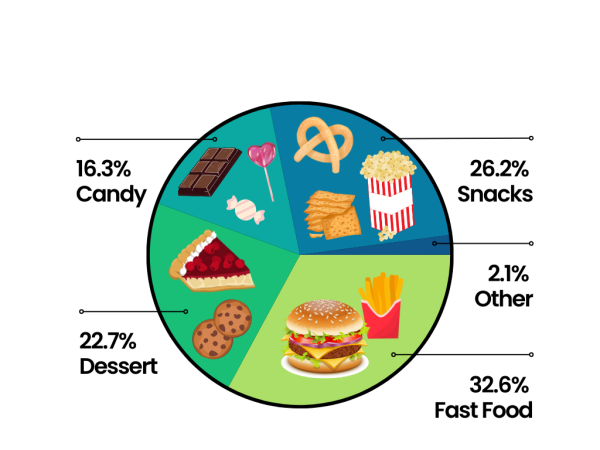Between savoring crispy cheese curds to smooth chocolate custard, nothing separates senior Cassidy Stephenson and her Culver’s meals.
Stephenson is one of Americans who indulge in both sweet and savory treats , and though people are taught to avoid unhealthy food, it seems the nation can’t get enough.
According to the National Library of Medicine, the term “junk food” was coined by Michael Jacobson in 1972. It refers to food that is low in nutritional value but high in calories, comparing the food to junk.
Regular, healthier food is made up of three major nutrients: carbohydrates, proteins and both unsaturated and saturated fats. Junk foods notoriously lack all three. Instead of nutrients, junk food relies on sugar, salt and fat, as well as artificial additives for processed foods.
In a survey of 100 random North students, 95 percent of them eat at least one junk food item daily.
Even with the lack of nutritional value, processed foods account for 20 percent to 60 percent of daily intake worldwide according to Medical News Today.
“There is definitely a lot more of it, I would say,” freshman Emma Cleveland said. “The convenience of it and the ease of it is leaving a prominent impact.”
Junk food can be found in many stores and restaurants, as well as in snacks, ranging from salty chips to sugary sweets. From fast-food to store bought, junk food is culturally prominent.
“I try to strike a balance, but I definitely lean more towards the unhealthy side, which is something I’m trying to work on,” sophomore Elsa Bachu said.
When thinking of stereotypical junk foods, people immediately imagine sugary, plentiful desserts. While this is true, there are some foods that might appear healthier, like types of pizza or sandwiches, but aren’t. This is evident in restaurants and fast-food chains.
“I don’t think there’s anything wrong with it in moderation, but there comes up a point where it starts to become too much, and it does seem to be very prominent nowadays,” Bachu said.
Stephenson sees the initial mental effects of fast-food, as it’s an opportunity for her to happily eat tasty food and bond with others.
“My favorite part of the week is when I get to go to Culver’s with my friends,” Stephenson said. “It always makes me feel better getting to unwind after a stressful week, just getting to eat and talk with my favorite people.”
Though eating candy or fast-food may taste great at the moment, there are negative effects of excessive consumption. Without any balance or moderation, the sugar and saturated fat levels, known for causing heart issues in these unhealthy foods, can decrease a person’s overall health.
According to Health Direct, some long-term effects of junk food include type two diabetes, heart-related issues, obesity and depression while some short-term negative effects include tooth decay and fatigue.
“In the moment it feels good, but then I think about it too much and I feel bad,” freshman Phoenix Cano said.
Dopamine, a hormone released by the brain to give a person the sense of pleasure, is the leading agent of junk food cravings. It’s closely associated with reinforcement and reward, causing individuals to continue eating these foods. “Food euphoria” refers to the feeling of that dopamine release.
“If the brain observes that the amount of dopamine is too high, it begins removing dopamine receptors to keep things balanced,” Healthline writer Kris Gunnars said. “When there are fewer receptors, more dopamine is needed to reach the same effect, which causes people to start eating more junk food to reach the same level of reward as before.”
There are various ways for people to lessen junk food consumption. Outside factors like exercise, sleep and a solid schedule can help curb cravings. Focusing on food, putting more attention towards consumed foods by planning full, nutritious meals will prioritize healthy habits.
“I think cooking for myself definitely helps me eat healthier,” senior Julia Schmidt said. “I usually feel better and stay energized for much longer after cooking a meal for myself where I was able to have things that I like, while also still having a lot of nutrients.”
Avoid being vulnerable to junk foods. This includes shopping hungry, eating in front of the television or in the car and going without water or proper meals. Instead of drinking something unhealthy, like soda, use any appetite for something nutritious, like milk.
“I think although it’s talked about a lot, it’s still a huge problem and is very important,” Bachu said. “Eating healthy contributes to a lot of factors in life, and people should always remember that.”






